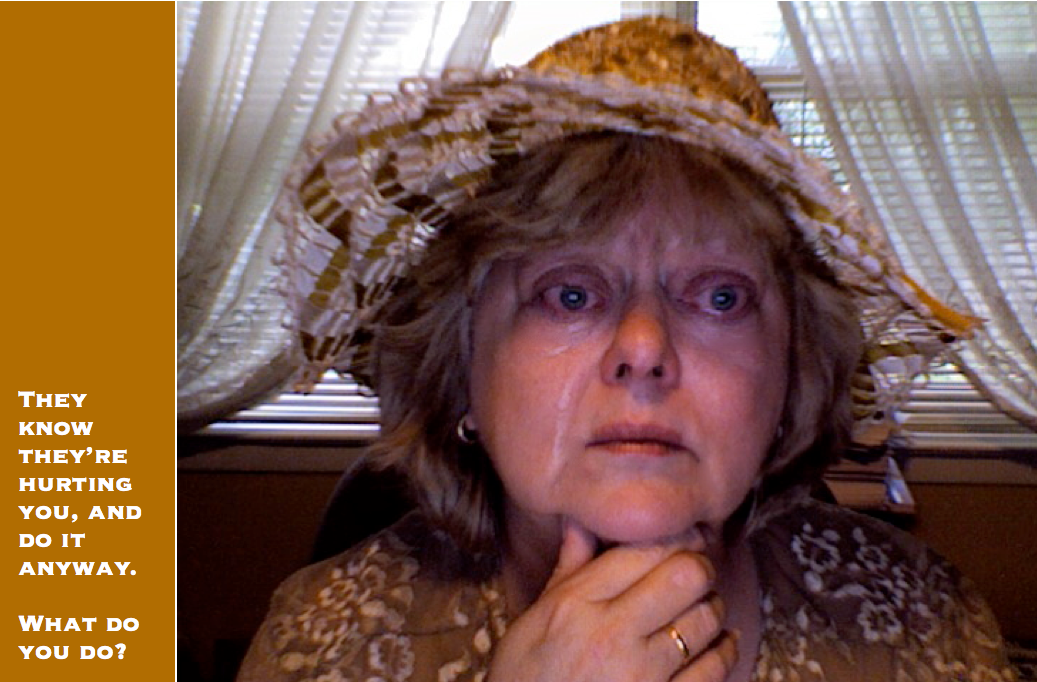(Illustrator Unknown)
WARNING: This is a no-edit zone…
Sooner or later, we all reach the end of our proverbial rope. You know the point I mean. The one where you say if one more thing happens, it’s going to send you careening over the edge, or launch you into full postal mode.
The obscure “they” will give you all sorts of advice. To let go, to ignore, to blow off the challenges. They’ll tell you to not worry. (I ask you, when you’re worried is there any phrase that can make you worry more than being told not to worry?) They’ll tell you that everything will be okay, it’ll work out; things will settle down and be just fine.
Their words are well-intentioned. They’re meant to help, but they don’t. They’re empty and they’re falling on ears that want solutions, not platitudes.
Now that doesn’t mean that these well-intentioned folks are wrong. There are reasons why those phrases got coined. There’s truth in them. At least some truth in them.
Let go:
The gem in this tidbit is that when you hold on too tightly, you choke. You pour all your effort and energy into the problem and there’s nothing left to devote to the solution. So let go of the problem, and you gain a little distance. That’s good for perspective, for seeing clearly. Getting a clear picture of the actual challenge, distanced from fears you project onto it, and then you have a better chance of focusing energy on a solution to the problem.
Simply put, if you’re choking, you focus on what’s choking you. If you’re not choking, you can focus on what could choke you and how to keep from choking.
Ignore, blow off challenges:
I don’t know anyone who’s ever constructively solved a challenge by ignoring it, or by blowing it off. So on the surface, there is no gem in this one. Or is there?
Well, if the challenge isn’t really a challenge but it becomes one because we magnify and amplify something into becoming a challenge, then there is a gem in ignoring or blowing it off. Sort of.
Actually, it’s wiser, in my humble opinion, to tell myself to stop trying to make a mountain out of a molehill and press on with my life. That’s truly not ignoring or blowing off something because it’s addressing it. But the solution is to choose not to give it time or attention, to not magnify or amplify so that it can’t become a challenge.
It’s amazing how many things in life we perceive as challenges that truly are only challenges because we’ve made them ones. A bit of advice I’ve found helpful: Will it matter in five years?
Whatever the challenge or perceived challenge is, if it isn’t impacting life five years from now, then it doesn’t qualify or meet the standard required to put me at the end of my rope.
Don’t worry:
This is probably my pet peeve of all the possible end-of-your-ropers. When something is important enough to you to drive you to the end of your rope, you’re going to worry. You’re human, it matters, and worry goes with the turf on being human and things that matter.
Worry isn’t something to be avoided. It has positive aspects, too. Worry can often keep us from acting foolishly, making mistakes. It gives us the chance to pause and consider the consequences of our actions, to weigh the results before they happen. Worry can be positive. But not if we allow it free reign. We need to take the good from worry–the warnings and alerts, if you will–and reconcile the rest. Why? Because the rest are the bad parts, the ones that drive you to the edge of reason, suck the life right out of you, and drain you dry. These are home to fear and doubt, which will chew you up and spit you out–if you permit it. Choose not to. Accept what you can do to minimize the risks you must take and those you choose to take, and reconcile the rest.
Things will be okay, work out, be fine:
The gem in this is that often they will–in those cases where you’re bringing on more worry than is warranted. Things do work out, and often are fine. Sometimes without pain and suffering and sacrifice and sometimes with it.
It goes without saying, an important key to balance in your life–meaning, staying away from end–of-your-rope situations, is to avoid situations that carry end-of-your-rope hazards. Sounds easy, but some times, it’s not practical or reasonable or even logical to do that. Daily life often requires us to jump into situations where we take risks. What we can do whenever possible, is to not jump blindly, to do all we can to minimize our risks. We must think with our heads and our hearts to get the best and most complete picture so that we can make the best and most accurate assessments. To judge our risks and outcomes to the best of our ability.
If you’re at the end of your rope and think you can’t take one more thing, let me share this with you:
I’ve been there. I’ve felt that. And I know from experience, you’re not at the end of your rope. You might think you are, believe with all your heart you are, but you’re not.
You can take one more thing–or two more, or however many it takes.
You can deal with whatever is in front of you–and you can do so constructively.
You can turn things around. Maybe not easily, certainly not without effort, but it can be done if you’ve the will to do it.
When in this end-of-my-rope position, I thought I literally couldn’t stand another blow. But I did. And I learned that God never gives anyone more than they can handle. Admittedly, I’ve felt like He believes I’m stronger than I really am, or that He’d taken a snooze or forgotten me in the hall. But what I discovered is that I became stronger because of the challenge. He wasn’t napping and I wasn’t forgotten. I learned my true nature, my shortcomings and strengths and realized where I drew my lines in the sand. I also learned to rely on and trust God. When I can’t, He can. That doesn’t mean I don’t have to do my part–or that my part is protected from me getting scraped knees, or a nose, or knuckles or a bruised ego. It means, I might be really close to the end of that rope, but He’s standing right there beside me saying, “Do what you can, I’ll do the rest. Trust me. Believe in me and my promises to you, and I’ll do the rest.”
A while back, I posted a graphic about when you reach the end of your rope, reach up to the hem of His robe. The graphic served as a potent reminder to me of all written here, and much more.
It reminded me of all God’s promises and in those I find strength and, frankly, whatever I need at the time I need it.
That’s really the core of the end-of-your-rope challenges. They’re sirens that go off in our lives warning us to change something. To reconsider what we’ve been doing, what we’re about to do. What we want to do. They’re alarms that signal trouble ahead. And they’re reminders that no matter what we face, we do not face it alone.
Many problems seem too big, too complex, or too much for us to handle. We’re mere mortals; not infallible, and not capable of enduring everything, especially everything at once. But they serve to remind us too that we’re also home to immortal souls, and through them, we have access to one who sees all clearly, whose vision is not limited as ours is, and that He guards and protects us–yes, even at times from ourselves. They remind us that one stands with us, and there is no problem too big, too complex, too much for Him to handle.
So when we feel we’re at the end of our rope, we are blessed. We have the ability to reach up, grab a hold of the hem of His robe, and allow our will to fall to His will. Where we see no path ahead, He does. Where we have no hope, He instills it. Where we flounder, He flourishes.
And He is always home, always there, always willing and waiting–even hoping–that we will call on Him so that He then, not infringing on our free will (a gift He bestowed), can show us the way back from the edge. A safe retreat that makes clear how we got to the end of that rope and what we must to do to avoid ending up there again.
There is not a promise that if you walk in faith with God you won’t have challenges. There is a truth revealed in the Word that if you live, you will face challenges. Walking alone means spending a lot of time on the edge, dangling at the end of that rope. But walking in faith with God, when those challenges come, you know you’re never walking alone and you have the blessing of His wisdom and His insight and His unconditional love for you, which assures you that whatever comes is or He will fashion it, into something that best serves your greater good.
Blessings,
Vicki
P.S. What does the photo above have to do with being at the end of your rope? Some will say nothing. I’ll say that God’s been around a lot longer than 2,000 years. Christ is over 2,000 years old, and His sacrifice still grants us access to God. No matter what we’ve done, no matter what. Two thousand years.
The average country lasts around 200 years.
Upon which does your wisdom suggest you rely?
See what I mean? It’s not only germane, it’s pointed–and poignant.
Just something to think about…
Blessings,
Vicki
c2009, Vicki Hinze





